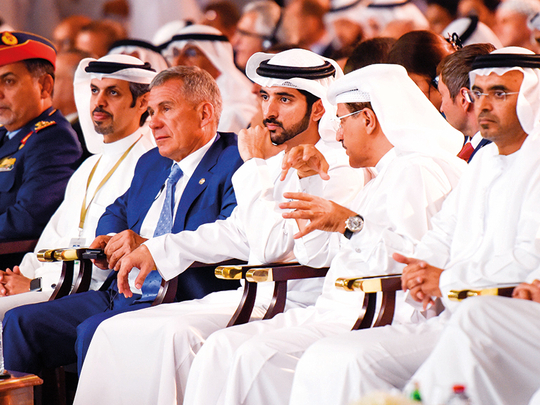
Dubai: Dubai’s share of the Islamic economy stood at Dh33 billion and contributed to 8.3 per cent of its GDP in 2016 against 7.6 per cent in 2014, registering a growth rate of 14 per cent, Sultan Bin Saeed Al Mansoori, UAE’s Minister of Economy told delegates at the Global Islamic Economy Summit (GIES) on Tuesday.
The summit was opened by Shaikh Hamdan Bin Mohammad Bin Rashid Al Maktoum, Dubai Crown Prince and Chairman of Dubai Executive Council, in the presence of Rustom Minnikhanov, president of the Republic of Tatarstan.
"There has been growing contribution of Islamic banks for sustainable development investment and entrepreneurship."
— Sultan Bin Saeed Al Mansoori | UAE Minister of Economy
The summit was attended by more than 3,000 policymakers, business leaders and industry experts.
“We are at an important stage of the economic transformations that have begun to change the mechanisms of industrial and commercial activities, and are significantly impacting global partnerships,” Al Mansoori said.
“As a result of modern technology, such as blockchain, digital currencies, and artificial intelligence, the dynamics of the global Islamic economy have changed through the introduction of new challenges as well as opportunities,” Al Mansoori added.
Growing contribution
“There has been growing contribution of Islamic banks for sustainable development investment and entrepreneurship,” Al Mansoori told delegates at the GIES.
The UAE is also focussing on Islamic funding, halal products and lifestyle in the space of the islamic economy, which are in line with the country’s vision for 2021.
The vision “sets the key themes for the socio-economic development of the UAE” and calls for “a shift to a diversified and knowledge-based economy.”
The UAE has been making strides in the Islamic economy. Islamic banking penetration is on the rise, most notably in the UAE, while Islamic finance overtook conventional loans in Malaysia in 2017 as the main driver of growth of the domestic banking system. The sector has moved beyond the core hubs of the UAE and Malaysia to include new entrants from East Africa to Central Asia, as governments seek to bolster financial inclusion.
“Through this summit, Dubai aims to unify the global efforts to promote the Islamic economy and to create an environment in which everyone will work to develop an integrated Islamic economic model, in which the Islamic economy will be able to expand its product base and move towards new horizons,” Majid Saif Al Ghurair, chairman of Dubai Chamber of Commerce and Industry said.
“We look forward to transforming the ideas we explore today into a plan of action, and to setting the necessary procedures and frameworks that can radically transform the Islamic Economy and to establish it as a leading global economic model,” Al Ghurair added.












